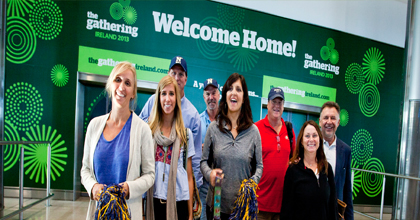Failte Ireland says the Gathering is working,


Fáilte Ireland has said The Gathering tourism initiative is already delivering benefits to the Irish economy.
It says the tourist sector has seen its best St Patrick’s Day in years, with many hotels in Dublin reporting no vacancies between now and Friday.
The country’s biggest parade saw hundreds of thousands of spectators descend on the streets of Dublin.
About 8,000 foreign visitors led the procession in the People’s Parade, which was a Gathering event.
Around 120,000 people passed through the arrivals gate at Dublin airport in the lead-up to this year’s festival, and organisers expect them to contribute towards a €50m financial windfall for the economy.
Fáilte Ireland said it had seen particularly strong levels of visitors from the United States.
Head of communications Alex Connolly said it was clear The Gathering was playing its part.
“The Gathering has been out there for the last number of months as a big hook for visitors to come over. We would be working very hard to get more and more people in this year for The Gathering, and that’s what’s happened,” he said.
“This is the official start of the tourism season.”
Discounts on generic medication’s used to subsidise pharmacy losses
Pharmacists claim generic drug discounts used to offset losses on other medication
Chemist shop: large discounts from generic drug firms are helping to subsidise losses.
Pharmacists are using double- digit discounts from generic drug firms to subsidise losses in other parts of their business, according to the Irish Pharmacy Union (IPU).
The union said one in four of its members was operating at a loss, despite reports that they enjoy discounts of up to 90 per cent on the price of generic drugs for which they are reimbursed by the Health Service Executive.
Two generic drug companies are offering pharmacists discounts ranging from 40 to 90 per cent on drugs they are dispensing for the HSE,
PROZAC
Neither company was named, but in the examples quoted the HSE was paying the pharmacist 10 times as much as pharmacists were paying for drugs such as aciclovir (used to treat cold sores) and the antidepressant fluoxetine, originally known as Prozac.
Separately, a survey showed that people who pay for their own drugs are paying as much as 18 times the price of the same generic medicine in Northern Ireland. Pharmacists in the Republic were charging €166 for olanzapine, compared with just €9 in the North.
The price of atorvastatin, which is prescribed for high cholesterol, was €2.87 in Northern Ireland. In the Republic private customers pay up to €33.77, while the HSE pays €18.22.
The IPU said “purchase price incentives” were a feature of all businesses. It pointed out that the HSE benefited from the practice, having recouped 8.2 per cent of the cost of all medicines from payments to pharmacists since 2009.
Small market
Small market
The union argues that generic medicines cost more in Ireland because they account for a relatively small part of the market and so sales volumes are lower. The amount of generics dispensed in Ireland is 18 per cent, or even less by value, compared to 80 per cent in the UK.
“Every time the Government and the manufacturers lower the price of medicines those reductions have been passed on by pharmacists to their patients. Further falls in medicine prices will occur and will also benefit patients,” a spokesman said.
Pharmacists have seen their payments cut three times in recent years. In 2009, some pharmacists withdrew from the HSE-funded drug schemes in a dispute over drug prices but their protest action fizzled out quickly.
Underage drinking and peer-pressure & a desire to conform and fit in is a Irish student’s dilemma
A FEW DRINKS NOW AND THEN DOES LITTLE HARM – BUT JUST BECAUSE EVERYBODY ELSE IS DOING IT, DOESN’T MEAN YOU HAVE TO,
The desire to conform and fit in, to be accepted as part of a group, is one that is common to all teenagers. What must be done in order to gain acceptance by one’s peers is not always consistent with the individual’s morals. However, if this behaviour is necessary to acquire ‘friendship’ then more often than not it is carried out for fear of being cast out, alone.
Underage drinking is nothing new in society, nor is it a phenomenon that is unique to Ireland. Where there exists a legal drinking age, there will be underage drinking. It is an undeniable state of affairs, which has been a part of life in the past, and will be for as long as the legislation regarding under-18s’ inability to purchase or consume alcohol remains in effect.
ONE-SIZE FITS ALL RULE
I am unsure as to what causes the sudden onrush of maturity that overcomes people on their 18th birthday. People are marginally different than they were the day before, perhaps even months before. I understand that no two people are the same and that reasonable drinking ages can not be set on an individual basis. However, the one-size fits all rule at 18 gives rise to the aforementioned underage drinking.
Alcohol-consumption, in moderation at any age, is perfectly fine. The problem, is the culture of excess. Ireland is renowned globally for its alcohol abuse. A fact, which I do not feel we should be proud of. Due to the illegal nature of alcohol to youths, most teenagers have their first encounter with alcohol in some field or parent-free house. There is a strong chance that peer pressure will have played a part in this. Pushed on by ‘friends’, kids as young as 13 and 14 will consume far more that their bodies are capable of handling.
I don’t think that there can be any argument that it would be preferable for young people to have their first taste of alcohol in the family home, under parental supervision. Parents could at least make an attempt to explain the importance of sensible drinking to their offspring, rather than having them being egged-on to the point of alcohol poisoning in what would be more favourable company in their eyes.
A SAFE ENVIRONMENT
Parents might not be the coolest people going in teenagers’ eyes but at least if they could get their first taste of alcohol out of their system in a safe environment, there is less of a chance that a stomach pumping will be required at a later stage. Fuddy duddies they may be, but I think that teenagers who have loving, trusting relationships with their parents are happier in all facets of life.
Excess is not the only problem when it comes to teenage drinking in Ireland, reliance on alcohol is equally as bad. I am a second-level student myself, and I can testify that all social gatherings succumb to a drearily formulaic routine. There seems to be a distinct inability for sober socialising in Ireland, not just among teenagers, but across all societal demographics.
I am not suggesting for a second that the entire population become teetotallers. I merely feel that is it a sad state of affairs that the social lubricant of alcohol is required for any kind of interaction at said events. What is even more depressing is the gloomy realisations of those who have decided to abstain from alcohol that without this magic relaxant they do not enjoy themselves as much but instead are more aware than usual of the typical idiotic antisocial drunken behaviour which accompanies alcohol consumption.
EXPRESSING FEELINGS WITHOUT ALCOHOL
A few drinks now and then does little harm. But all too often people do not limit themselves to a few – that would be far too sensible. The live fast, die young mentality is a sure-fire way to die prematurely of liver failure. People have the right to enjoy their nights out without having to step around vomit/be vomited on/babysit their overly-inebriated companions. There is always the few who take things a naggin too far and end up putting a dampener on proceedings for everyone.
What worries me further still is the legitimacy of drunken conversations. Science has shown that people still have control over their actions while in an intoxicated state. This does not stop them from blaming their behaviour on the alcohol though. If people needexternal substances such as alcohol to ‘be themselves’ I question their mental health. It is said that drunken words are sober thoughts. Why shouldn’t people be able to express their feelings without the assistance of alcohol?
MACHO BRAVADO V COMMON SENSE
One thing I will never understand is how people can say that they know they’ve had a good night because they were so sozzled they wake up criminally hungover the following morning and can’t remember a thing. This defies reason. There is a macho bravado when it comes to who can drink the most pints etc. All lunacy again. It requires a great degree of self-confidence and comfort with oneself to stay clear of the crowd and do things at one’s own pace. Consume as much alcohol as you like, provided you don’t behave in a way that will affect others’ enjoyment. Common sense is what’s needed when it comes to alcohol, in a serious way. And better examples from our elders wouldn’t go amiss.
Moreover, just because everybody else is doing it, doesn’t mean you have to. I guarantee that ‘uncool’ non-drinking friends who share your values and courage in defecting from the pack will offer you infinitely more in terms of friendship than image-conscious sheep who dare not deviate from the norm.
Stressful work & jobs increases chances of getting Alzheimer’s disease
Having a stressful job could increase the chance of developing Alzheimer’s in old age, research indicates.
New research indicates constant stress could raise the risk of Alzheimer’s – although it is well established that people who exercise their brains more are less prone.
When Sara Bengtsson, a PhD student at Umeå University in Sweden, looked at the relationship between levels of stress hormones in the brains of mice and their memories, she found those which were more stressed could not remember as well.
She also discovered that highly stressed mice had higher quantities of proteins called beta-amyloids, which are linked to Alzheimer’s.
High levels of these amyloids are thought to cause brain synapses to malfunction, leading to memory problems and other symptoms of the disease, which affects some 500,000 in Britain.
Specifically, Ms Bengtsson looked at levels of a stress steroid called allopregnanolone. In her study, mice which were given elevated levels of allopregnanolone were compared with those given a placebo.
While 41 per cent of the mice given the placebo exhibited an impaired memory, among those given high levels of the stress hormone, 79 per cent were memory-impaired.
Writing in her thesis submission, she said that high levels of the hormone “could be a mechanism behind stress-induced Alzheimer’s disease.”
She concluded that “chronic elevation of allopregnanolon accelerated the development of Alzheimer’s disease” in the mice, although she cautioned that more studies were required to grasp the clinical significance of her findings.
Dr Simon Ridley, head of research at the charity Alzheimer’s Research UK, noted: ‘It’s important to remember this research was not carried out in people.”
But he said: “Some research has already highlighted a possible link between chronic stress, cognitive decline and the development of Alzheimer’s, and further study in people is needed to fully investigate these links.
‘If we can better understand the risk factors for Alzheimer’s we can also empower people to make lifestyle changes to reduce their risk.
“Although we can’t say from these findings that chronic stress causes Alzheimer’s, there are a number of other health reasons for taking steps to manage our stress levels,’ she said.
“Research to understand the causes of the disease could identify targets for future treatment development, and we must invest in research to make a real difference to people’s lives.”
However, it is much more firmly established that using one’s brain intensively throughout life – for example by having an intellectually demanding job, or speaking another language, lowers the chance of developing Alzheimer’s.
Birds evolve shorter wings to survive on our roads
Birds in Nebraska have evolved shorter wings, which may help them avoid dying on roads by taking off quickly and darting away from cars.
Charles Brown of the University of Tulsa in Oklahoma has been picking up dead swallows for 30 years. Roadkill numbers have steadily declined since the 1980s, even as the number of roadside nests has risen. The killed birds have longer wings than birds caught in mist nets for research, and on average the caught birds’ wings have got shorter.
It makes sense: shorter wings are better for a quick vertical take-off, and improve manoeuvrability.
“Everything fits with the idea that it’s vehicular selection,” says Ronald Mumme of Allegheny College in Meadville, Pennsylvania.
However, Brown says that encounters with traffic may not be the only force at work. After a particularly cold May in 1996 killed about half the nesting population through starvation, wing lengths dropped markedly, perhaps because birds with shorter wings were better able to capture the remaining insects still on the wing.
The swallows are the latest case of humans influencing evolution. Fish are maturing more quickly because of commercial fishing, and two formerly diverging populations of Darwin’s Galapagos finches seem to be collapsing back into one now that food from bird feeders is replacing their natural diets.
New plans for addition of other animals including the giant PANDA to FOTA WILDLIFE PARK


FOTA WILDLIFE PARK HAS LODGED PLANS FOR A MASSIVE 27-ACRE EXPANSION THAT WILL CLEAR THE WAY FOR THE ARRIVAL OF TIGERS, LIONS, RHINOS AND RARE GIANT PANDAS.
The extension will add approximately 40% to Fota’s overall size and make it one of the largest wildlife parks in Europe.
It is hoped that the first phase of the €6m project, involving the addition of Sumatran tigers, will be complete and open to the public by next summer. Two tigers, currently in a French zoo, have been earmarked for Fota.
It is hoped that the first phase of the €6m project, involving the addition of Sumatran tigers, will be complete and open to the public by next summer. Two tigers, currently in a French zoo, have been earmarked for Fota.
 The wildlife park has also confirmed plans to secure two rare giant pandas and will be using Cork’s twinning relationship with Shanghai to strengthen its case.
The wildlife park has also confirmed plans to secure two rare giant pandas and will be using Cork’s twinning relationship with Shanghai to strengthen its case.
Senior government officials have already been brought on board to support the campaign, but it is expected to be a difficult process to complete with just a handful of pandas in zoos outside Asia.
In the meantime, it is planned to introduce a number of new Asian animals to Fota, many of which are endangered.
As well as Sumatran tigers, it is planned to introduce Asiatic tigers, rhinoceroses, Japanese cranes, Takin antelopes and Asian bears, if the plans to bring pandas to Cork are unsuccessful.
The Asian sanctuary site is being developed behind the penguin and bison enclosures.
As well as Sumatran tigers, it is planned to introduce Asiatic tigers, rhinoceroses, Japanese cranes, Takin antelopes and Asian bears, if the plans to bring pandas to Cork are unsuccessful.
The Asian sanctuary site is being developed behind the penguin and bison enclosures.
It will include 13 new buildings for animals, two new lakes, a second entrance building, a small souvenir shop and a viewing building.
Stephen Ryan of Fota Wildlife Park said it hadthey have just lodged plans for the exciting project and plan to start work immediately once planning permission is granted.
Stephen Ryan of Fota Wildlife Park said it hadthey have just lodged plans for the exciting project and plan to start work immediately once planning permission is granted.
“Once complete the addition of the Asian sanctuary will make Fota one of the biggest wildlife parks in Europe.
“It will add about a mile of extra footpaths,” added Mr Ryan. and increase the average time to complete the park from three hours to five.”
Given the increase in size, Fota is considering introducing a two-day pass for visitors to give them time to completely cover the park.
“It will add about a mile of extra footpaths,” added Mr Ryan. and increase the average time to complete the park from three hours to five.”
Given the increase in size, Fota is considering introducing a two-day pass for visitors to give them time to completely cover the park.
The park is already one of Ireland’s most popular attractions drawing almost 400,000 visitors each year.
Meanwhile, there has been a major setback for another significant Cork tourism project.
Fáilte Ireland has refused to give €4m funding to Cork County Council to develop Spike Island in Cork Harbour into a major tourism attraction and national park.
Meanwhile, there has been a major setback for another significant Cork tourism project.
Fáilte Ireland has refused to give €4m funding to Cork County Council to develop Spike Island in Cork Harbour into a major tourism attraction and national park.







No comments:
Post a Comment